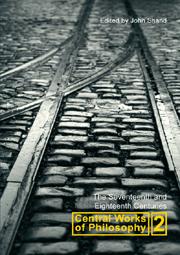Book contents
- Frontmatter
- Contents
- Contributors
- Preface
- Seventeenth- and Eighteenth-Century Philosophy: Introduction
- 1 René Descartes: Meditations on First Philosophy
- 2 Baruch Spinoza: Ethics
- 3 G. W. Leibniz: Monadology
- 4 Thomas Hobbes: Leviathan
- 5 John Locke: An Essay concerning Human Understanding
- 6 George Berkeley: A Treatise Concerning the Principles of Human Knowledge
- 7 David Hume: A Treatise of Human Nature
- 8 Jean-Jacques Rousseau: The Social Contract
- Index
2 - Baruch Spinoza: Ethics
- Frontmatter
- Contents
- Contributors
- Preface
- Seventeenth- and Eighteenth-Century Philosophy: Introduction
- 1 René Descartes: Meditations on First Philosophy
- 2 Baruch Spinoza: Ethics
- 3 G. W. Leibniz: Monadology
- 4 Thomas Hobbes: Leviathan
- 5 John Locke: An Essay concerning Human Understanding
- 6 George Berkeley: A Treatise Concerning the Principles of Human Knowledge
- 7 David Hume: A Treatise of Human Nature
- 8 Jean-Jacques Rousseau: The Social Contract
- Index
Summary
Baruch (or Benedictus) Spinoza was perhaps the most original and radical philosopher of his time. He was also, for just those reasons, the most vilified thinker of the early modern period. Even during Spinoza's own lifetime, the term “Spinozism” became synonymous with atheism, as political and religious authorities issued numerous and highly agitated condemnations of his ideas. Despite this formidable opposition, Spinoza and his followers exercised a good deal of influence upon the Enlightenment and modern philosophical, political and religious thought.
Biographical sketch
Spinoza was born in Amsterdam in 1632 to a prominent merchant family in the city's Portuguese–Jewish community. As a boy, he had undoubtedly been one of the star pupils in the congregation's Talmud Torah school. He was intellectually gifted, and this could not have gone unremarked by the congregation's rabbis. It is possible that Spinoza, as he made progress through his studies, was being groomed for a career as a rabbi. But he never made it into the upper levels of the curriculum, those which included advanced study of Talmud. At the age of 17, he was forced to cut short his formal studies to help run the family's importing business.
And then, on 27 July 1656, Spinoza was issued the harshest writ of cherem, or excommunication, ever pronounced by the Sephardic community of Amsterdam; it was never rescinded. We do not know for certain what Spinoza's “monstrous deeds” and “abominable heresies” were alleged to have been, but it is quite easy to make an educated guess.
- Type
- Chapter
- Information
- Central Works of Philosophy , pp. 37 - 60Publisher: Acumen PublishingPrint publication year: 2005



